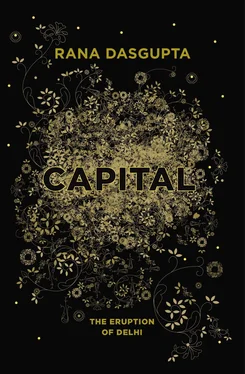The Colonel is over ninety and has been retired for decades. He is slightly deaf, so his military bark is even more stentorian. He wears a rumpled safari suit — the uniform, in earlier times, of Indian public servants. He sits down at a writing desk on which there are notes written in Urdu in notebooks that he has made himself by recycling the blank sides of A4 printed pages: the pages are cut into four and stapled together at the spine. He gestures to me to sit across the desk from him.
“In the villages where I grew up,” he says, “the houses all had courtyards. You entered from the street into the courtyard, where there would be cattle and hay, and beds for sleeping outside. The rooms were in a line along the far end of the courtyard: they were all on the ground floor, and built of mud and wooden beams. The roof jutted far out over the edge of the building so that the rooms were always in shade. All these rooms were bedrooms: the living area was the courtyard. If people came to visit, there would be tea in the courtyard around a table. We didn’t host grand events at home — for weddings and religious events there was a community centre which we all helped to build and maintain.”
Colonel Oberoi grew up in a tribal district of North-West Frontier Province, a place of extraordinary natural beauty where the peaks of the Himalayas are always within sight and the Indus river is at its proudest and most lush. In August 1947, this region became part of Pakistan, and Colonel Oberoi’s family became Partition refugees.
“At that time I was posted in Bombay for military training. My family was stuck in Mardan, near the Khyber Pass, and they couldn’t set out for India because my wife was pregnant. They were looked after by a Muslim colleague of mine, a Captain Jabbar who hosted them in his military accommodation and made sure they were safe: my sister and her husband, two cousins and their children, and my aunt and mother. The news coming out of those places was terrible and I was very concerned. Two weeks after Independence I went to the evacuee organisation in Amritsar. Friends of mine who had family in Lahore were given military escorts to cross the border and fetch them, but Mardan was too far away for that. I was very worried and didn’t know what to do. Finally they made provision to airlift my family out. I still remember the moment when the announcement came over the loudspeakers: ‘Lieutenant Oberoi’s family will be airlifted out.’
“But my family was not ready to be airlifted. My wife couldn’t move. So she had to wait until our eldest son was born, which didn’t happen till October. By that time it was too late for the airlift. So Captain Jabbar personally escorted them to Peshawar, where he handed them over to the care of a Major from Haryana, who brought my family over the border in a regimental train. Delhi was chaos at that time — all the trains had been stopped. I could not get to Delhi and nor could they. It took another month before we were finally reunited.”
As he talks, Colonel Oberoi draws extensively. Plans of houses, maps of family movements.
“I wasn’t based in Delhi in those years: I was moving everywhere with the army. In 1949 I was sent to England on a long gunnery staff course. After that, I was posted all over India. But I had no accommodation of my own, which was a big problem. My extended family was still staying in a one-room house with a relative in Delhi. Delhi was full of refugees: a couple of hundred thousand people were still living under tents and thatched roofs in the various camps while the government tried to find housing for them. A colleague of mine told me to ask about evacuee property. They showed me a house that had been abandoned by a Muslim family and I went to the resettlement director to ask if it could be allotted to me. He said I was ineligible because I was posted outside Delhi. ‘But we are building a defence colony,’ he said, ‘where you might qualify for a plot.’”
The authorities made it easy for army men to buy these plots by offering instalment plans over several years. In the post-Independence conception of Delhi, it was to be a city of high-minded people committed to the national cause, and the choicest of the new ‘colonies’ that sprouted quickly on all sides of the British bureaucratic city designed by Lutyens were given over to people from outside the government whose work was essential to the nation: in addition to Defence Colony there were neighbourhoods reserved for journalists, lawyers and the like. Businesspeople, by contrast, whose activities were considered more vulgar and self-serving, were housed in the comparatively remote neighbourhoods of west Delhi.
“I sat down and wrote a petition letter. The next day they called and told me that my application had been successful. I bought the plot. When I came back to Delhi, we built this house.”
I have come to see Colonel Oberoi to look around his courtyard house built, anachronistically, in the new city, but he wishes to end our meeting at the time we agreed — in spite of the fact that I turned up late and missed half of it — so there is no time for the tour. It is time for his walk to the market. We stand up.
I ask him what he is writing in his notebooks.
“This is my poetry,” he says.
“You write in Urdu?”
“I write in many languages. My mother tongue was Saraiki, a dialect of Punjabi spoken in the place I was born. I used to play with boys from the tribes who spoke Pashto. As a boy in the 1920s I spoke six languages every day: Saraiki, Punjabi, Hindi, Pashto, English and Urdu. I used to write letters in three languages using three different scripts: Hindi to my mother and sister, English to my friends, and Urdu to my uncles. I write English poetry too. But Urdu is the best language for poetry.”
With the mention of poetry, Colonel Oberoi forgets his haste to leave. He wants to read to me. He goes to the bookshelf to get a stack of notebooks full of poetry.
“I have been writing poetry for seventy years,” he says.
Much of it has been composed in old, unused diaries. He flicks through them, looking for the poems he wishes to read. There is something touching about these volumes, whose days and months are printed in grey English from left to right and from what readers of the Latin script consider front to back, and which are filled with hand-written poetry written the other way — the poetry cutting backwards through the days. He reads in a deep and musical voice, pausing after each poem. They are odd verses which give expression to unusual curiosities. “All the emotions we feel for other human beings, do they have any place in paradise? For if there is nothing to bind us together there, it is no paradise to me.”
Jaise nadee ke bahaav main ek pathroon ka jaloos hai
Bahe jaa rahe hain ludak ludak
Wajood use na thahraav hai
Na lagaav hai na dosti hai
Na hai dushmanee
Chaahat nahin, nafrat nahin
Jannat hai uska naam agar jannat hamein nahin chahiye.
Like the march of stones
Tossing and tumbling in the current of a river
Without identity or roots
Without attachments of friendship
Or of enmity
No desire, no hatred —
If that’s what you call heaven
I want none of it. 23
Severe and regimented in his general dealings, something tender and mellifluous emerges from Colonel Oberoi in our conversation about poetry. It comes, in part, from the memory of stupendous nature in the mind of this man who has lived so long in what has become one of the world’s largest conurbations. But his Urdu poetry asserts also his allegiance to a lost culture, one that Hindus like him once shared with Muslims, a cosmopolitan, multilingual culture in which poetry and the life of the spirit found more ample expression.
Читать дальше











